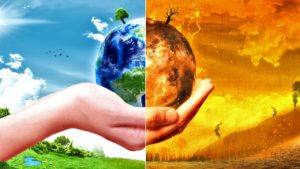The world as we know it is in crisis!
What are we to make of the Border Wall, American and European populism, “fake news” and the murder of journalists, Donald Trump, New-Right populism, throughout the West, Kim Jong-un’s nuclear button, China as a global power, the denial of the scientific consensus on global climate change, sly Putin, and the many other issues that keep us up at night? Above all, what will happen with BREXIT this spring!
All of these baffling phenomena have one thing in common. They are all manifestations of the ongoing and necessarily conflictual evolution of a novel form of political organization known as the Modern nation-state.
By Modernity, I mean a revolution in social norms that is based upon 1) skeptical attitudes, 2) the emergence of individualistic identities, 3) formal routines, and 4) divergent political and social realms. By Nation-state, I mean a “symbolic community to which people voluntarily devote their primary political loyalties despite the many particularistic loyalties–religious, cultural, ethnic, political, social, economic, gender, and athletic–that otherwise divide them.” Modernity and the Nation-state are abstract terms. But they are useful tools. Like the best tools, they help us make sense of the evolution and realities of global politics. They also help to alert us to the fragility of our world and the possibility that we may be the cause of its ruin.
But they are useful tools. Like the best tools, they help us make sense of the evolution and realities of global politics. They also help to alert us to the fragility of our world and the possibility that we may be the cause of its ruin.
My story is divided into five interlocking chapters. First, in the segment called Modern Politics, I will introduce you to some basic concepts about modernity and the Modern nation-state. Second, we travel down the road the West has taken toward a particular form of the nation-state: Liberalism. Third, we consider an initially credible but ultimately failed path: Leninism. Fourth, we confront the pathos and anger of people living in the fractured Postcolonial world of weak nation-states. Finally, we return to our starting point to examine the ecstasy and agony of the nation-state in an age of Global Politics.
The study of politics is always interesting. But, let’s face it, this is not a typical period in world history. Americans and Europeans, in particular, are undergoing a crisis of political identity. None of us can afford to ignore the fact that our country (as well as most of Europe) is deeply polarized and that fundamental values, such as liberty, equality, and tolerance, are at stake. This polarization means that we cannot be indifferent to these issues. We must address them if we are to be good citizens.
For this reason, I shall refer to two particular themes throughout our course:
1) the centrality of agreement on facts–and fact seeking– in democratic life. If we can’t agree on facts, there can be no democracy. There is no such thing as an “alternative fact”!
2) the threat to Liberal democracy represented by Populist politics.
My pedagogical goals are ambitious and extend far beyond introducing you to the field we call “political science.” These are my major objectives:
- To cultivate your “deep knowing” of social and political phenomena, rather than “much knowing” (a distinction drawn by the Greek philosopher, Heraclitus)
- To hone your analytical abilities
- To increase your capacity to defend arguments and possibly persuade others that you are right
- To encourage you to develop a critical perspective on everything you think you know—especially a perspective that is consonant with your choice to attend Notre Dame (no normal university).
For the basic requirements of our course, look closely HERE You are responsible for knowing all of this information.
Throughout our political travels, I will have a modest personal objective. If I can fundamentally change the way you think about world politics, I shall be pleased.
NOTE: Please do not use electronic devices of any kind during our class, including laptops, cell phones, tablets, tape recorders, and any other personal digital device. My classroom is a tweet-free zone!
